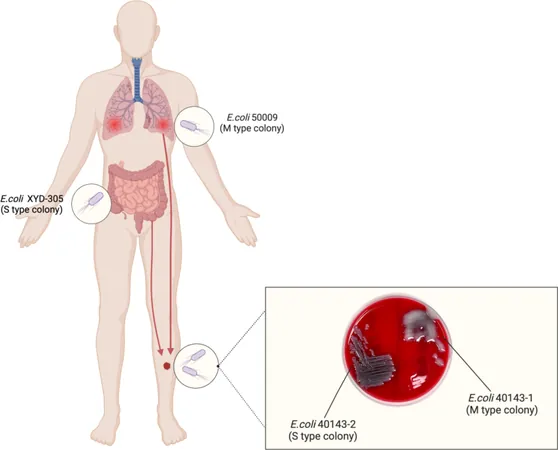
Shocking New Study Reveals Vitamin B12 'Normal' Levels May Not Shield Seniors from Cognitive Decline!
2025-04-01
Author: Rajesh
Introduction
Recent research published in the Annals of Neurology has raised alarm bells about the sufficiency of current vitamin B12 recommendations for older adults. The study indicates that levels deemed 'normal' may actually correlate with cognitive deterioration, white matter damage, and slow cognitive processing speeds in this demographic.
The Importance of Vitamin B12
Vitamin B12, an essential nutrient, plays a vital role in producing red blood cells, maintaining nerve function, and synthesizing DNA. The standard recommended daily intake for adults stands at 2.4 mcg, typically sourced from foods like meat, fish, poultry, and dairy. However, for those who find it challenging to get enough through diet, supplementation is available.
Risks of Vitamin B12 Deficiency
Though vitamin B12 deficiency is relatively rare in the U.S., older adults and those with digestive issues are more prone to insufficiency. Untreated deficiency can lead to severe health complications, including anemia, fatigue, neurological disorders, and even mood fluctuations.
Study Overview
The research team from the University of California, San Francisco, sought to explore whether vitamin B12 levels within the 'normal' range could still evoke signs of neurological damage or impair cognitive function among healthy seniors. Dr. Ari J. Green from UCSF noted, “Previous studies defining adequate B12 levels might have overlooked subtle functional changes that can emerge even without obvious symptoms. A reevaluation of B12 deficiency could enable earlier interventions and help prevent cognitive decline."
Key Findings
In this study, 231 cognitively healthy participants with an average age of 71 and a blood concentration of approximately 414.8 pmol/L were assessed. Researchers employed visual evoked potential testing, processing speed assessments, and MRIs to evaluate neurological health. Factors such as age, sex, education level, and cardiovascular risks were meticulously considered to ensure accurate findings.
Cognitive Decline and Brain Damage
Results indicated that individuals with lower active vitamin B12 levels exhibited slower processing speeds, with cognitive decline distinctly more pronounced in the elderly. Furthermore, older participants experienced significant delays in visual stimulus responses, highlighting reduced brain conductivity.
MRI Insights
MRIs revealed that those with lower levels of transcobalamin (Holo-TC), the active form of B12, had increased white matter hyperintensities—indicative of critical brain damage. An intriguing correlation was also noted where elevated levels of inactive B12 were associated with heightened T-Tau protein levels in the blood, signaling neurodegeneration.
Conclusion
These findings send a compelling message: the existing guidelines for vitamin B12 might not be sufficient for safeguarding neurological health, especially among older adults. As co-author Alexandra Beaudry-Richard emphasized, “We should consider B12 supplementation for older individuals exhibiting neurological symptoms, even if their levels appear normal. There is an urgent need for more research into the biological mechanisms underpinning B12 insufficiency, as this may be a preventable cause of cognitive decline.”
Call to Action
This groundbreaking study opens the door for reevaluating dietary guidelines and clinical practices surrounding vitamin B12 and its crucial role in preventing cognitive impairment as we age. As such, it's time for seniors and caregivers alike to take a closer look at their B12 levels and consider proactive measures for brain health!





 Brasil (PT)
Brasil (PT)
 Canada (EN)
Canada (EN)
 Chile (ES)
Chile (ES)
 Česko (CS)
Česko (CS)
 대한민국 (KO)
대한민국 (KO)
 España (ES)
España (ES)
 France (FR)
France (FR)
 Hong Kong (EN)
Hong Kong (EN)
 Italia (IT)
Italia (IT)
 日本 (JA)
日本 (JA)
 Magyarország (HU)
Magyarország (HU)
 Norge (NO)
Norge (NO)
 Polska (PL)
Polska (PL)
 Schweiz (DE)
Schweiz (DE)
 Singapore (EN)
Singapore (EN)
 Sverige (SV)
Sverige (SV)
 Suomi (FI)
Suomi (FI)
 Türkiye (TR)
Türkiye (TR)
 الإمارات العربية المتحدة (AR)
الإمارات العربية المتحدة (AR)